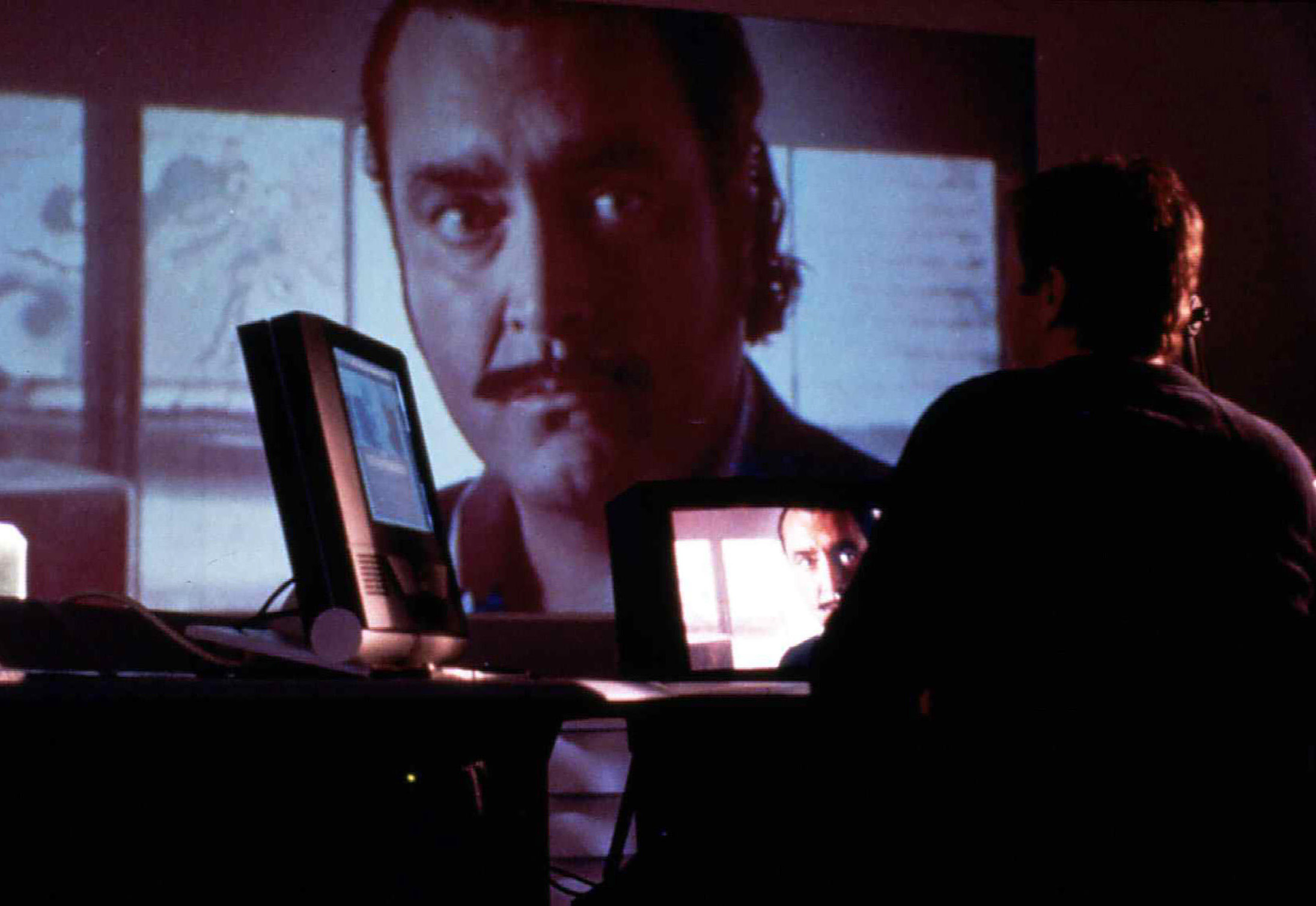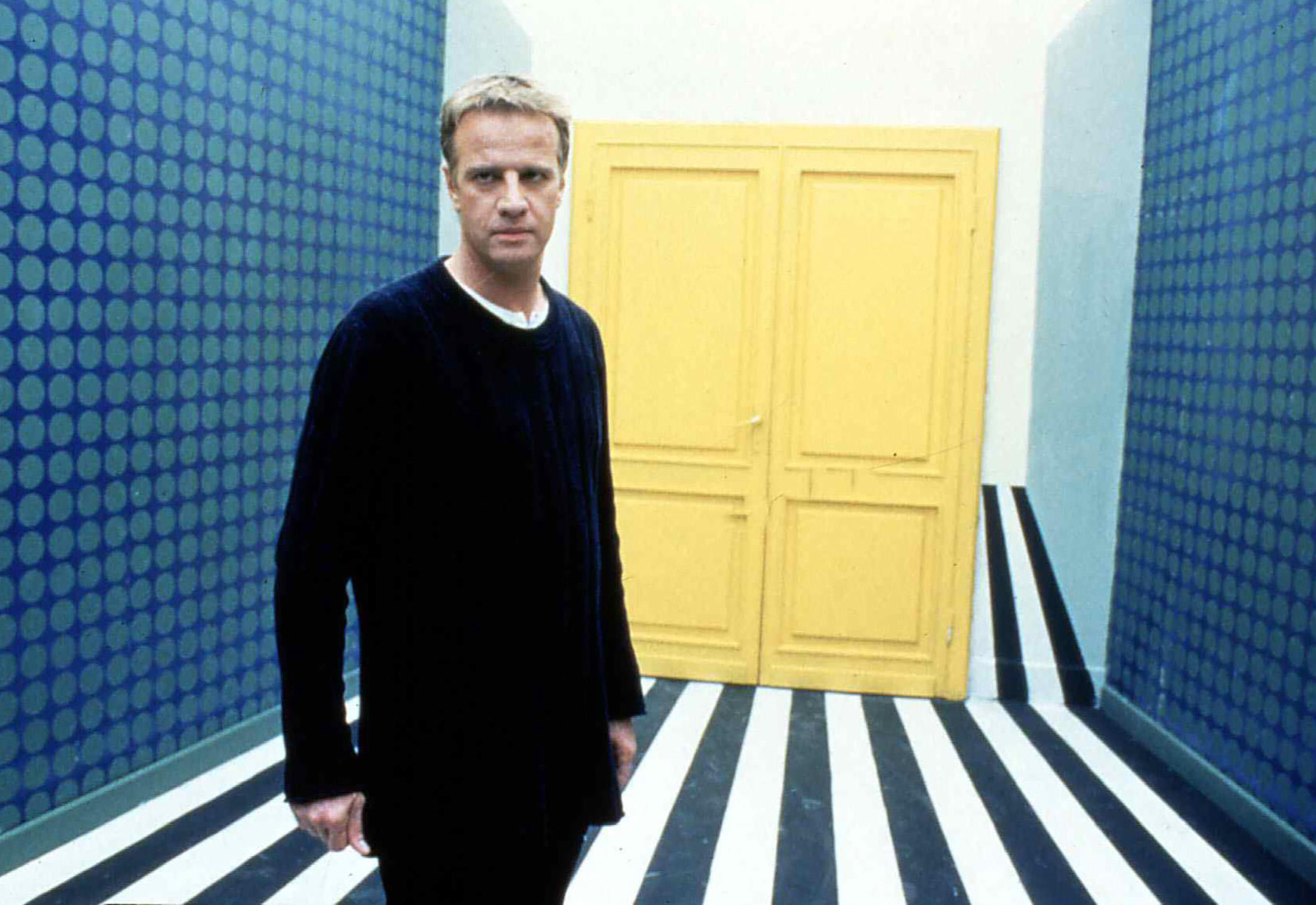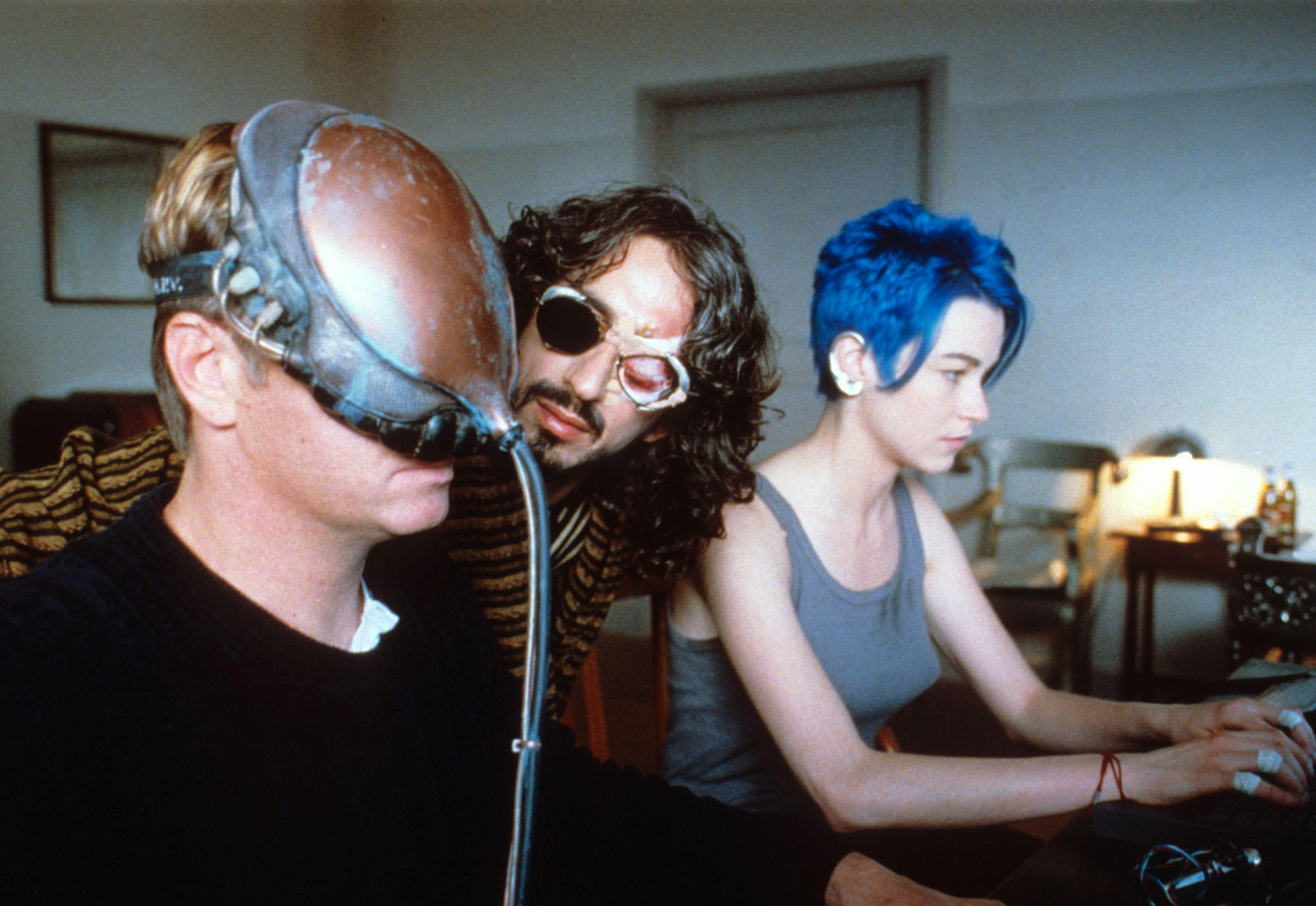Nirvana
Conversation between Carlo Antonelli and Gabriele Salvatores

-
CADid you know there was a cult Nirvana following among people in their thirties?
-
GSWell, there have been a few clues, both from the public and because the Sapienza University in Rome is doing a whole study on Nirvana, which is also quite interesting.
-
CACan you tell me a little more?
-
GSThey are making a double of Solo, the character played by Diego Abatantuono, in the metaverse. There are actually a whole host of exciting things happening around Nirvana.
-
CAHave you taken part in this academic work?
-
GSI will definitely take part. I’ll be giving a talk between November and December, they call it a lectio magistralis although I’m certainly neither a master and nor do I teach!
-
CAHave they understood Nirvana in your opinion?
-
GSWell, first of all, I believe that we have seen something very important, which is that the film actually very closely resembles certain things we are experiencing. Now, I don’t know if it was an attempt by what was once called the System, but it certainly had the effect of isolating us, and in part it happened to me. I’m talking about us all isolating in our own little worlds – real or fake depending on the various social networks, etc. – and distancing ourselves from others. There is this feeling of being isolated – almost like the character of Solo – inside a video game that you didn’t invent and in which you are forced to repeat the same life, both personal and collective.
-
CASo much so that Solo’s request is always the same: “Delete me”.
-
GSYes, which is another curious discourse. I don’t want to get into anything too dramatic but I was reading just lately that there is a lot of talk about suicide, which is a scary idea.
-
CAWhat do you mean?
-
GSWell, it is being talked about more and more. Among young people and in novels, films, etc. There is this idea of renouncing as an act of protest if you will. That is: we did not choose to come into the world and somehow ending your life is an act of autonomy because it’s a choice you make. I don’t know if can explain it. Plus, there’s obviously this issue of the fake, digital dimension. Let’s call it fake. The name Nirvana was inspired by many things – it’s not just the famous band whose front man committed suicide and left behind the Neil Young lyric: “Better to burn out than to fade away” – and one of them is eastern philosophies. In Buddhism and Hinduism, reality is called Maya, which means illusion or fiction. This thing, which was once an abstract, philosophical discourse is actually becoming very concrete, thanks to new technologies that are not always used correctly.

-
CAYou were telling me that Nirvana has many meanings. Can we unravel them?
-
GSIt’s true. The main inspiration came to me from something silly: we were playing football with Diego Abatantuono and Fabrizio Bentivoglio. The PlayStation hadn’t been invented yet but we had Nintendo and Diego laughingly comes up with: “What do you think the players do when we turn off the console? Are they taking a shower, going out with their girlfriends, going to a restaurant, what the fuck are they doing?”
-
CANirvana was the place where players went to rest.
-
GSYes! [he laughs] Perfect. Exactly. At the time, I was reading a bit – just out of curiosity – about eastern philosophy and the like. You know, we think of the reincarnation theory as in, “Ah, great! I have another life, I’ve been reincarnated”. But the goal is not to reincarnate. And to stop spinning around in circles on a carousel that never stops spinning, as Tiziano Terzani said. Instead, one should descend and go into Nirvana, which is abstraction from everything and total awareness. I don’t think this is true, in the sense that I don’t think this will be waiting for us, unfortunately, but thanks to six years of therapy, I have a lot of doubts about absolute death.
-
CAMay I ask whether you’re in therapy now or it was something you did at the time?
-
GSI did it from the age of 60 onwards, after Nirvana.
-
CAHow old are you now?
-
GSI just turned 72, I’m from the 1950s, right in the middle of the last century.
-
CAYou came from an entirely different world? What was the film you made before Nirvana?
-
GSAh, let me think.
-
CAI didn’t study Wikipedia, I didn’t do my homework.
-
GSSud! This is how it went. When Mediterraneo won the Oscar, we were already shooting Puerto Escondido. When we heard about the Oscar, I said, “That’s it. I don’t want to be labelled as the guy who just does travel, escaping, friendship.” I wanted to do a film about people who weren’t on the move, something socially engaged, and the result was Sud, which is a film about the occupation of a polling station in the south by unemployed people. It was actually a big hit because it came right after the Oscar and the success of Puerto Escondido, which isn’t one of my favourite films. But anyway, after Sud, I began to reread some sci-fi, which I had always been a fan of.

-
CADid you read Urania [Italian sci-fi magazine, Ndr.] as a kid?
-
GSYes, of course! I read Urania and then as I got a little older...
-
CALanciostory? And there was L’Eternauta too, wasn’t there? [both sci-fi comics, Ndr.]
-
GSOf course. And Flash Gordon even earlier, when I was really little. But what really interested me was American sociological sci-fi from the 1960s, 70s and 80s. From Philip K. Dick to Bruce Sterling and William Gibson and cyberpunk... The idea of that mixture of man and machine.
-
CAYou can really feel that in Nirvana.
-
GSAs I was reading all these things, having all these thoughts and really wanting to do something, Nirvana began to take shape. After the Oscar, you know, I felt a bit blessed, because I really hadn’t been expecting it.
-
CAWhere do you keep it?
-
GSIt’s on a bookshelf in the living room. I use it as a bookend.
-
CADid you know there’s a legend that the real Hollywood stars always keep theirs in the toilet?
-
GSI actually did keep it in the bathroom for a bit but because it looked good! There was this perfect place for it. But apart from that, I didn’t want it around for a long time because it just looked at me as if to say, “You won an Oscar. Now you have to do things.” and it annoyed me. I’ve made peace with it now so I can have it around.
-
CAThanks to therapy. But as we were saying, you got into cyberpunk.
-
GSCecchi Gori, the producer, was terrified: “What do they mean, a sci-fi film in Italy? And how can we say no now that he’s gone and won a bloody Oscar?” [he laughs] So I used that as leverage to do something different to everything else in Italy and to prove that we could, in some way, go beyond our cinematic forefathers, which were neorealism and Italian comedy, into different territories. I have to say that I’m very happy to see many younger colleagues now moving in a similar direction because, and without any false modesty, I feel that we opened a new alternative path for Italian cinema. It was unthinkable in 1996.
-
CAHow much did Nirvana cost?
-
GSParadoxically, Nirvana is the film that earned the most for the production company because it didn’t cost much [it took $10 million in Italy alone, Ed.].
-
CAAnd where was it filmed?
-
GSWe filmed the whole thing in a factory. First we went around the world because I wanted to set in somewhere like Varanasi or Marrakech, I wanted to have the various cities that feature in the film. But I realised it would be more interesting to film it in a studio, which is what happened in the end. The big megalopolises contain different worlds. So in the end, we reconstructed everything in an old Alfa Romeo assembly plant, the one from the final scene with Rocco and his brothers. It doesn’t exist anymore.

-
CAThat’s a shame! Speaking of neorealism...
-
GSExactly! It was in ruins so we rebuilt everything which was a big undertaking in terms of set design. Bear in mind that special effects were incredibly rare in Italy at the time. So who did them?
-
CASo who did them?
-
GSThey were done by... bloody hell! Hang on, they were a young team who have since done very well professionally! Got it, Paola Trisoglio and Stefano Marinoni [who have been involved in more than 250 films since and won a David di Donatello award for The Invisible Boy, also by Salvatores, Ed.]. That was a big risk too, because we had no idea what it would look like. I’ve just remembered now that we presented it to Harvey Weinstein, who bought and distributed it in America.
-
CAIs Harvey still in prison?
-
GSYes, of course.
-
CADid you ever notice his behaviour?
-
GSHe tried it on with Stefania Rocca all the time. But I didn’t spend much time with him, he was the American buyer and distributor. He did say to me though, when he watched the film, that the special effects were better than theirs. And I replied that there was absolutely no comparison, to which he said: “No, I know, but you use them to tell a story, we use them to impress.”
-
CAWell Harvey certainly wasn’t stupid. How did you inform yourself about future technologies?
-
GSThat’s an interesting question. I read so much – and it was very boring at times – written by scientists and electronic engineers about what could theoretically be made. Some things seemed strange and impossible but then came about. Communication for example, smartphones, screens, seeing the person you’re talking to and that kind of thing, not to mention self-driving cars and the overwhelming power of technology over our direct relationships.

-
CAWhen watching now, what strikes me more than anything is the idea of a chip card that contains everything from our health insurance to payment options, which we have or are very close to having.
-
GSExactly. We do have it. Just as long as they don’t implant it under our skin.
-
CAThe same thing with the visors, which were already known as virtual reality.
-
GSYeah, the opportunity to enter a world that wasn’t real.
-
CAThe Metaverse, of course, but also ocular implants, which are around the corner, or at least retinal advancements.
-
GSSure.
-
CAThe other thing I thought is that you also extensively documented design. There is a red sofa that keeps cropping up.
-
GSThe red sofa is by an Italian from Bologna called Massimo Iosa Ghini. Yes, I studied the design trends, even the more extreme ones, from the time. It’s the spaces in our homes that are no longer truly filled with your life – memories, objects, old photos etc – but with technology, screens and technological tools. Including the one I’m living in, which alas is an automated house that I am in constant conflict with. In the last film I made, Il Ritorno di Casanova, Toni Servillo lives in an automated house that rebels against him.
-
CAThe other thing that is quietly noticeable is the presence of a form of Alexa or Siri.
-
GSYes, which talks to you, answers you, interacts with you.
-
CAAnd then the boom in zoom calls and so on during these pandemic years.
-
GSLook, yes, I made up some of these things by reading around but a lot of these things, to be honest, can already be found in novels, mainly by Philip K. Dick. His definition, for example, of a lost world and parallel world is very funny. He says: if you’re in Central Park and you see a dinosaur coming and everyone is running away from it, including you, you have landed in a lost world. If, on the other hand, you’re in Central Park and there’s a little girl with a dinosaur on a lead, then you’re in a parallel world [he laughs].
-
CANot everyone remembers that in the 1990s, this is a film from the second half of the decade, there was a strong globalisation movement in the contemporary art environment, with the rise of various biennials all over the world, all of a sudden. You would land at airports where global brands were gradually beginning to take over. This huge mix of cultures was being created. In the film, you’ve got Japanese kimonos in Morocco, the shapely penthouses of Brooklyn and China everywhere. Everything is traditional and new at the same time. You tend to deliberately mix everything up.
-
GSYes, in fact that was what led us to create a megalopolis as a metaphor for the world we live in but in which you can take a lift and get to the Indian neighbourhood.

-
CALike in video games. Are you proud of Nirvana?
-
GSI am. It is one of the films that I like and I can’t say that about all the films I have made.
-
CABut in the end... what’s it all about, what is Nirvana saying?
-
GS[he laughs] It’s a strange movie.
-
CAYou didn’t ever go back into that dimension again, did you?
-
GSNo. Although there is one film which came immediately after Nirvana and was the only one that didn’t do well enough, called Denti. It’s a film that I love and also has a very strong dream dimension. It’s not science fiction, but it has an abstract dimension, let’s say.
-
CAIs that somewhere you go? Abstraction, worlds outside of reality...
-
GSYes, often. I find reality disappointing.
-
CASo where the hell are you going?
-
GSI’m quoting Fellini! [he laughs]
-
CAMaybe you should try taking LSD to dream like he did. I’ve got a question for you: where will you go when you die? Assuming you will die.
-
GSAh, I will definitely die, alas.
-
CAI say this because as we get older, we get closer to it.
-
GSOh, of course, it’s in the back of your mind, no doubt. There is a beautiful poem by De Andrade, who is a South American poet, which goes: I realise there aren’t many sweets left in the bag because I ate them like a child would, so I want to savour these last sweets one by one and I no longer want to compromise or waste time on things that don’t interest me. [the poem is I Counted my Years, Ed.]. I feel a bit like that... being 70 is deadly! I mean, I didn’t have any problems at 40 or 50 or 60, but fuck me, at 70 things change, you know?
-
CABuried or cremated?
-
GSCremated, definitely!
-
CAIn an urn or do you want to scatter the ashes?
-
GSScatter the ashes, like my parents who are in the sea at Posillipo. They are Neapolitans like me so... Speaking of which, there is a phrase in Nirvana that I really like: you will become a snowflake that does not fall anywhere.